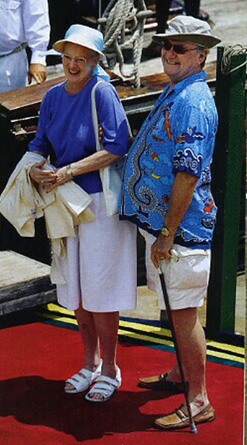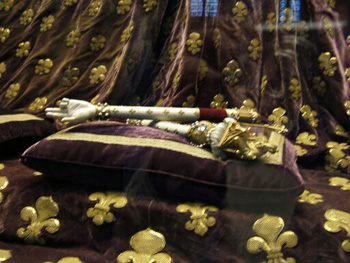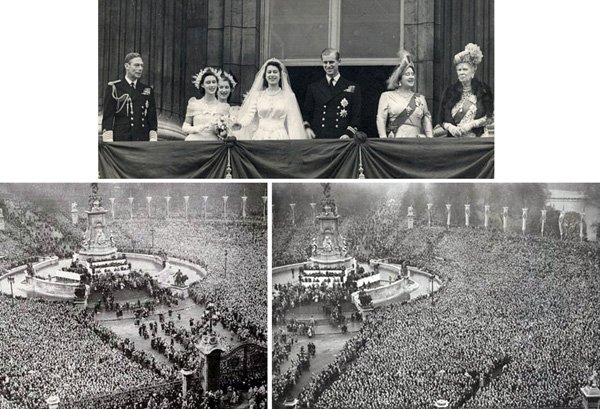Organic Society
 |
 |
 |
 |
 |
 |
 |
Personification of Principles - IV
A Model for Others
Must Be a Slave of Principles
In society, the function of representation, which is partially hereditary and partially personal, is proper to the organization of the nobility. The role of example in the Middle Ages was institutionalized: At the apex of society was a man whose highest function was to govern it, to represent it, and to serve as example for it: the King.
We can say that a King has two scepters: in the order of the facts, he governs his kingdom. In the order of the tendencies and ideas, he is a model for his kingdom; he is the highest representation of the country.
Before all else, he is the prototype, the paradigm to be imitated by all. All members of society have their sights turned toward him in order to imitate him. Given that he has the obligation to be excellent and to tend toward sanctity, they aim to imitate him morally, but also in all other aspects of the social and cultural realms.
Besides the King, the Royal Family, which is an extension of the person of the King, also has the obligation to serve as models. The same process applies to the higher degrees of nobility, which are linked to, and mixed with, the Royal Family; likewise for the middle nobility and the lower nobility, down to the simple gentleman. He is the root of the nobility established among the people; he brings to the people the elevation of the nobility and takes their strong sap to transmit to the nobility.
A slavery to principles
 This function of the nobility demands a great deal of abnegation and humility from all. It calls for abnegation and humility because it is difficult for someone to admit
that he should imitate others. But it is also arduous for the one who is meant to be imitated. This is because when a person understands that his function is to serve as a model for others, he has to make a complete rejection of every vulgar enjoyable thing that life could offer him personally.
This function of the nobility demands a great deal of abnegation and humility from all. It calls for abnegation and humility because it is difficult for someone to admit
that he should imitate others. But it is also arduous for the one who is meant to be imitated. This is because when a person understands that his function is to serve as a model for others, he has to make a complete rejection of every vulgar enjoyable thing that life could offer him personally.
This position demands a constant denial of the laissez faire spirit, of whatever is relaxed and fun, in order to always, always follow a behavior in accordance with principles and honor, whose incarnation the noble must be.
At depth this demands complete allegiance to the principles: a slavery at every moment in every circumstance. It is only this slavery that truly gives the person conditions to be a model.
So, at the apex of society, the King should be a slave of principles. Going down the scale, the nobles must also be slaves of principles, but they already have the model of the King, which makes their role easier. Further down the scale, the role of example increases and the difficulty to follow only abstract principles diminishes. However, since all these examples are in effect personalized principles, the result is that in a Catholic Civilization everything is based on principles.
Principles from a religious perspective
What are principles from a religious perspective?
Our Lord Jesus Christ is the Word of God Incarnate. He came to show us through His life and teachings all the principles He has as God. So, for us to live by principles, we must follow the model of Our Lord, renouncing our defects in order to serve as models for others.
In a Catholic Society the upper levels have more obligation to know and live the principles of Our Lord; the lower ones must then imitate them in what they have of good. If all were to accomplish this goal, this society would have fully realized the words of St. Paul: “It is no longer I who live, but Christ who lives in me.”
With this, we can understand the highest ideal of a Catholic Civilization.
The need for a hierarchy of classes
We can also understand the reason why this civilization has to be hierarchical, why it must have different levels. The theoretical principles that emanate from the clergy and the intellectual class are passed first to the highest sphere of the social hierarchy.
 Afterwards, following the mechanism of examples we explained, the principles travel down to govern morality in society and to establish healthy styles of life and good customs that incarnate virtue, not only in treatises but in the lives of all its members.
Afterwards, following the mechanism of examples we explained, the principles travel down to govern morality in society and to establish healthy styles of life and good customs that incarnate virtue, not only in treatises but in the lives of all its members.
This can be affirmed regarding the nobility as well as the people. We have seen the medieval organization of the people (here and here) and how, as a class, it was constituted by closed societies of guilds, neighborhoods, universities etc. Each of those closed societies also had its elites and characteristic style of life. Those elites received examples that came from higher elites, which ultimately touched upon the nobility. Thus, the same process applied until those models came to influence even the lowest levels of society.
Why does that system of examples presuppose a hierarchy?
In order for example to spread, two things are necessary: similarity and dissimilarity.
Imagine that Queen Elizabeth by her example were to inspire directly the Queen of Tongo. It is not really feasible because the difference between the two is too great. For the system of models to work, there must be a certain amount of dissimilarity and also a certain degree of similarity. Only thus is imitation possible.
Therefore, a hierarchical organization is necessary so that there will be a gradation in the different levels. Thus, for a duke to serve as an example for a baron is too violent a difference. But for a duke to be a model for a marquis is proportional.
The marquis, then, acts as model for the count on how to be a noble. The viscount transmits the lesson to the baron, who will impart what the knight needs to know. The squires learn from the knight and pass something of this on to the plebeians. Through this system, good customs and styles of life permeate the whole social organization from its summit to its lower levels.
I am persuaded that this is the highest function of the nobility, and that Sociology, if it were properly conceived and well written, would prove that what is most important in society is its function as a society of souls, not a society of bodies. And it would conclude that the most important role of temporal government is to be a model for its members.


We can say that a King has two scepters: in the order of the facts, he governs his kingdom. In the order of the tendencies and ideas, he is a model for his kingdom; he is the highest representation of the country.
Before all else, he is the prototype, the paradigm to be imitated by all. All members of society have their sights turned toward him in order to imitate him. Given that he has the obligation to be excellent and to tend toward sanctity, they aim to imitate him morally, but also in all other aspects of the social and cultural realms.
Besides the King, the Royal Family, which is an extension of the person of the King, also has the obligation to serve as models. The same process applies to the higher degrees of nobility, which are linked to, and mixed with, the Royal Family; likewise for the middle nobility and the lower nobility, down to the simple gentleman. He is the root of the nobility established among the people; he brings to the people the elevation of the nobility and takes their strong sap to transmit to the nobility.
A slavery to principles

Queen Margrethe and Prince Henrik of Denmark enjoying their personal comfort
This position demands a constant denial of the laissez faire spirit, of whatever is relaxed and fun, in order to always, always follow a behavior in accordance with principles and honor, whose incarnation the noble must be.
At depth this demands complete allegiance to the principles: a slavery at every moment in every circumstance. It is only this slavery that truly gives the person conditions to be a model.
So, at the apex of society, the King should be a slave of principles. Going down the scale, the nobles must also be slaves of principles, but they already have the model of the King, which makes their role easier. Further down the scale, the role of example increases and the difficulty to follow only abstract principles diminishes. However, since all these examples are in effect personalized principles, the result is that in a Catholic Civilization everything is based on principles.
Principles from a religious perspective
What are principles from a religious perspective?
Our Lord Jesus Christ is the Word of God Incarnate. He came to show us through His life and teachings all the principles He has as God. So, for us to live by principles, we must follow the model of Our Lord, renouncing our defects in order to serve as models for others.
In a Catholic Society the upper levels have more obligation to know and live the principles of Our Lord; the lower ones must then imitate them in what they have of good. If all were to accomplish this goal, this society would have fully realized the words of St. Paul: “It is no longer I who live, but Christ who lives in me.”
With this, we can understand the highest ideal of a Catholic Civilization.
The need for a hierarchy of classes
We can also understand the reason why this civilization has to be hierarchical, why it must have different levels. The theoretical principles that emanate from the clergy and the intellectual class are passed first to the highest sphere of the social hierarchy.

The Monarchy as a social and cultural model is more than a mere form of government
This can be affirmed regarding the nobility as well as the people. We have seen the medieval organization of the people (here and here) and how, as a class, it was constituted by closed societies of guilds, neighborhoods, universities etc. Each of those closed societies also had its elites and characteristic style of life. Those elites received examples that came from higher elites, which ultimately touched upon the nobility. Thus, the same process applied until those models came to influence even the lowest levels of society.
Why does that system of examples presuppose a hierarchy?
In order for example to spread, two things are necessary: similarity and dissimilarity.
Imagine that Queen Elizabeth by her example were to inspire directly the Queen of Tongo. It is not really feasible because the difference between the two is too great. For the system of models to work, there must be a certain amount of dissimilarity and also a certain degree of similarity. Only thus is imitation possible.
Therefore, a hierarchical organization is necessary so that there will be a gradation in the different levels. Thus, for a duke to serve as an example for a baron is too violent a difference. But for a duke to be a model for a marquis is proportional.
The marquis, then, acts as model for the count on how to be a noble. The viscount transmits the lesson to the baron, who will impart what the knight needs to know. The squires learn from the knight and pass something of this on to the plebeians. Through this system, good customs and styles of life permeate the whole social organization from its summit to its lower levels.
I am persuaded that this is the highest function of the nobility, and that Sociology, if it were properly conceived and well written, would prove that what is most important in society is its function as a society of souls, not a society of bodies. And it would conclude that the most important role of temporal government is to be a model for its members.

On November 1947, 2 million English gathered in front of Buckingham Palace to salute Princess Elizabeth after her wedding - admiration for the Monarchy as a style of life

Posted June 6, 2014
Organic Society was a theme dear to the late Prof. Plinio Corrêa de Oliveira. He addressed this topic on countless occasions during his life - at times in lectures for the formation of his disciples, at times in meetings with friends who gathered to study the social aspects and history of Christendom, at times just in passing.
Prof. Plinio
Atila S. Guimarães selected excerpts of these lectures and conversations from the transcripts of tapes and his own personal notes. He translated and adapted them into articles for the TIA website. In these texts fidelity to the original ideas and words is kept as much as possible.
______________________
______________________












